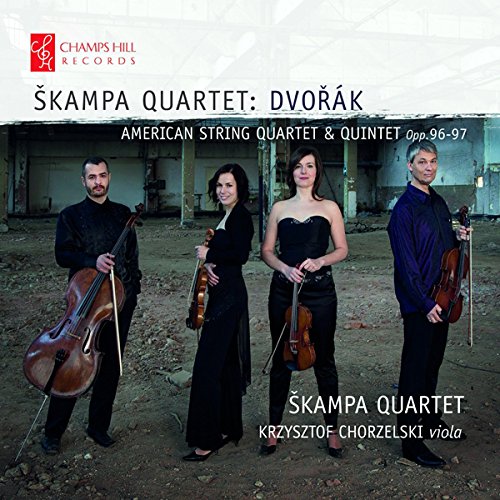DVOŘÁK American String Quartet and Quintet
View record and artist detailsRecord and Artist Details
Composer or Director: Antonín Dvořák
Genre:
Chamber
Label: Champs Hill
Magazine Review Date: 08/2017
Media Format: CD or Download
Media Runtime: 61
Mastering:
DDD
Catalogue Number: CHRCD110

Tracks:
| Composition | Artist Credit |
|---|---|
| String Quartet No. 12, 'American' |
Antonín Dvořák, Composer
Antonín Dvořák, Composer Skampa Qt |
| String Quintet, 'American' |
Antonín Dvořák, Composer
Antonín Dvořák, Composer Krzysztof Chorzelski, Viola Skampa Qt |
Author: Harriet Smith
Throughout the American Quartet the Škampa have an ease of manner that is reminiscent of the iconic reading by the Pavel Haas Quartet. That manifests itself right at the start, the viola player Radim Sedmidubský lustrously effective in the opening melody. The slow movement is deliciously inward, the Škampa taking their time and finding an extraordinary intensity in its closing moments. I like, too, their way with the Scherzo, which doesn’t have the supercharged energy of the Emerson (a quality that persists even through the twice-repeated Trio). In its place we have warmth and elasticity as phrases are shared among the four players. Perhaps some will find the Pavel Haas, a degree faster, closer to the Molto vivace marking but the Škampa certainly don’t sound sluggish. The finale unfolds with great exuberance and a delight in Dvořák’s ever-changing textures. They also avoid the slightly distracting agogic ticks of the Pavel Haas (track 4, 0'51"), while the chorale-like third theme (from 2'20") is rapt indeed.
For the far less well-known American Quintet the Škampa have borrowed the Belcea’s viola player, Krzysztof Chorzelski – a classy move. He is absolutely on the same wavelength as the quartet and this is a reading that gives the music time to breathe, conjuring a sense of great vistas in the manner of Dvořák’s contemporaneous Ninth Symphony.
In the Allegro vivo Scherzo they relish the Dvořákian technique of setting a movement in motion with just a simple repeated note (here on the second viola). When the melody finally arrives, the second violin is suitably espressivo. Throughout the work, they balance warmth and clarity to superb effect, qualities particularly well illustrated in the variation-form slow movement, be it the lyrical theme itself or the tremolo-laden fourth variation. All cares are cast away in an infectious account of the bouncy finale, the players palpably enjoying the endless variety with which Dvořák treats the rondo theme. With a warmly realistic recording from Champs Hill’s Music Room, this is a tremendous achievement.
Discover the world's largest classical music catalogue with Presto Music.

Gramophone Digital Club
- Digital Edition
- Digital Archive
- Reviews Database
- Full website access
From £8.75 / month
Subscribe
Gramophone Full Club
- Print Edition
- Digital Edition
- Digital Archive
- Reviews Database
- Full website access
From £11.00 / month
Subscribe
If you are a library, university or other organisation that would be interested in an institutional subscription to Gramophone please click here for further information.




